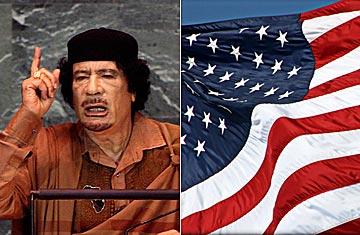
Six months after the Lockerbie bomber flew home from a Scottish jail to a rapturous Tripoli welcome, a very different reception is taking place in the Libyan capital this week: the first U.S. government-sponsored trade mission to this country in some 37 years.
Libya has been shut off from the U.S. for decades — starting in 1981, when President Ronald Reagan banned Americans from traveling to the country because of Libya's support for terrorist organizations, and then through subsequent U.S. sanctions. But on Saturday, Feb. 20, 25 American executives arrived in Libya to see if they can do business. U.S. Commerce Department officials set up two large cardboard signs decorated with the American flag in the lobby of Tripoli's swank Corinthia Hotel. Little U.S. and Libyan flags intertwined in a display on a welcome desk, alongside brochures explaining to Libyans what each of the American companies produces.
The group includes the defense companies Northrop Grumman Electronic Systems and Raytheon International Inc., as well as major manufacturers like Motorola, Boeing and others producing satellites, medical equipment and pipelines. The return of the Lockerbie bomber may have enraged U.S. officials and millions of Americans, but, says Assistant U.S. Secretary of Commerce Nicole Lamb-Hale, this week's trip is aimed at moving on from that bitter history. "We're certain this marks a new chapter in our relationship and that it will help to strengthen economic and political ties," she said in Tripoli.
U.S. firms have good reason to rush to Libya. The oil-rich nation is sitting atop a giant cash surplus, with foreign reserves of nearly $140 billion. Muammar Gaddafi, who has ruled Libya for four decades and was once described by Ronald Reagan as "the mad dog of the Middle East," has said he intends to spend a lot of that money overhauling his country's creaking infrastructure, which was barely updated through more than two decades of international embargoes. (U.S. sanctions were lifted in 2004 following Libya's abandonment of its nuclear weapons program.)
The American business delegates arrived just as most Europeans were banned from visiting. On Feb. 16, Gaddafi canceled all Libyan visas for citizens of the 25 Shengen countries in Europe, which share common immigration procedures. The decree was the latest round in a long and personal disagreement with Switzerland, which began in July 2008, when Swiss police arrested Gaddafi's son Hannibal and his wife for allegedly assaulting two of their servants in Geneva. Libyan and European officials are working frantically to resolve the conflict, but the European visa ban meant the U.S. execs arrived to a nearly empty hotel. (Among the few other hotel guests this weekend was Palestinian leader Mahmoud Abbas, in town to meet Gaddafi in advance of next month's Arab League summit in Tripoli.)
The U.S. shouldn't bet on an easy run in Libya. In fact, American firms are late to the scramble for the country's riches. If they look out their hotel windows, they will see crews from Korean, Turkish and Italian companies building luxury seaside towers, including an Intercontinental Hotel; a Starwood Four Points and a Marriott hotel are scheduled to open next year. U.S. businesses are not expected to seal any deals this week; with few contacts, they are focusing on just breaking the ice with Libyans. "This is a get-to-know-Libya trip," says Gene Cretz, the first U.S. ambassador to Libya since the 1970s. "There has been estrangement for 30 years, and we are still searching for the language to talk to each other."
The disconnect is deep. When the U.S. declared its embargo against Libya in the '80s, Gaddafi banned all teaching of English in schools, as well as English-language books and movies. Libyan children have long been taught that the U.S. is their enemy. "Only 10 years ago, we were in outright confrontation with the West," says Youssef Sawani, executive director of the Gaddafi Development Foundation, a hugely powerful body headed by Gaddafi's son Saif al-Islam. "It will take some time to change."
Last August's return of the Lockerbie bomber, Abdel Basset Ali al-Megrahi, who was convicted of murdering 270 people (including 189 Americans) when a Pan Am jet exploded over Scotland in 1988, didn't help. A Scottish judge freed al-Megrahi on compassionate grounds, saying he was almost certain to die of cancer within three months. Saturday marked the six-month anniversary of al-Megrahi's homecoming, which unleashed huge rejoicing among Libyans and condemnation from Washington. A U.S. trade mission was slated for last November but was scrapped when White House officials intervened, saying the feelings over al-Megrahi were still too raw, according to a Commerce Department official accompanying the business delegation to Tripoli.
A short drive from the delegate's hotel, down a side street in a crowded neighborhood, al-Megrahi's sprawling house is now guarded around the clock by uniformed police. When I tried to pay a visit to the family over the weekend, three Libyan police officers outside the high, bolted gates blocked the way, ordering me to leave. U.S. companies hope they might have an easier time breaking down the barriers in Libya.
